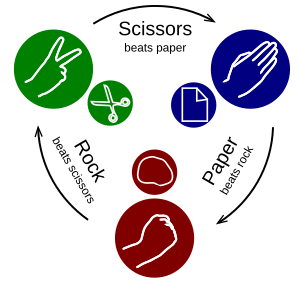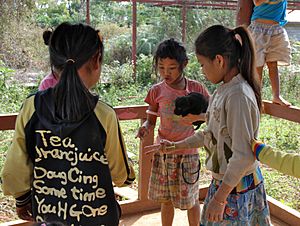Rock paper scissors facts for kids

A chart showing how the three game elements interact
|
|
| Genre(s) | Hand game |
|---|---|
| Players | 2 or more |
| Setup time | None |
| Playing time | Instant |
| Random chance | None |
| Skill(s) required | Psychology |
Rock, paper, scissors is a fun hand game. Two people play it using their hands. It's often used to pick someone. Think of it like flipping a coin! But it's not totally random. If you play a lot, you might learn how your opponent plays. This can help you win!
Contents
Rock, Paper, Scissors: The Game
This game is popular all over the world. People use it in many ways. For example, sports players might use it instead of a coin toss. This helps them decide who starts a game. It's also used in some role-playing games. This is because it needs no special equipment. Some websites even use it for fun bets.
How to Play
Players count to three out loud. They might say "Rock! Paper! Scissors!" or "Reaux! Sham! Beaux!". Each time, they swing a closed fist down. On the third count, or right after, they "throw" one of three hand shapes. They show this shape to their opponent.
- Rock looks like a closed fist.
- Paper is an open, flat hand.
- Scissors uses your index and middle fingers stretched out.
Winning and Losing
The goal is to pick a hand shape that beats your opponent's. Here's how it works:
- Rock smashes scissors. Rock wins!
- Paper covers rock. Paper wins!
- Scissors cuts paper. Scissors wins!
If both players pick the same shape, it's a tie. When there's a tie, you just play again! This game is special because no one shape always wins. It's like a cycle where each shape beats one other shape. Many times, people play "best two out of three" matches. This means you need to win two rounds to win the whole game.
Around the World
The name of the game can change. Sometimes the three parts are in a different order. Or "stone" might be used instead of "rock". People in other countries have their own names for it.
- In Japan, it's called Janken or Yakyuken.
- In Korea, it's Kawi Bawi Bo.
- In France, it's Pierre-Papier-Ciseaux.
- In Chile, it's Ca-Chi-Pun.
- In South Africa, it's known as Ching-Chong-Cha.
Images for kids
-
Cézanne's Large Trees Under the Jas de Bouffan sold for over $11 million in 2005.
See also
 In Spanish: Piedra, papel o tijera para niños
In Spanish: Piedra, papel o tijera para niños
 | Shirley Ann Jackson |
 | Garett Morgan |
 | J. Ernest Wilkins Jr. |
 | Elijah McCoy |








